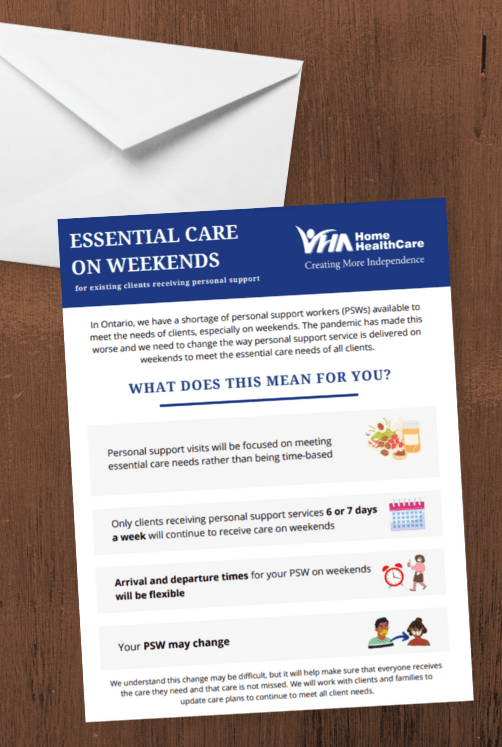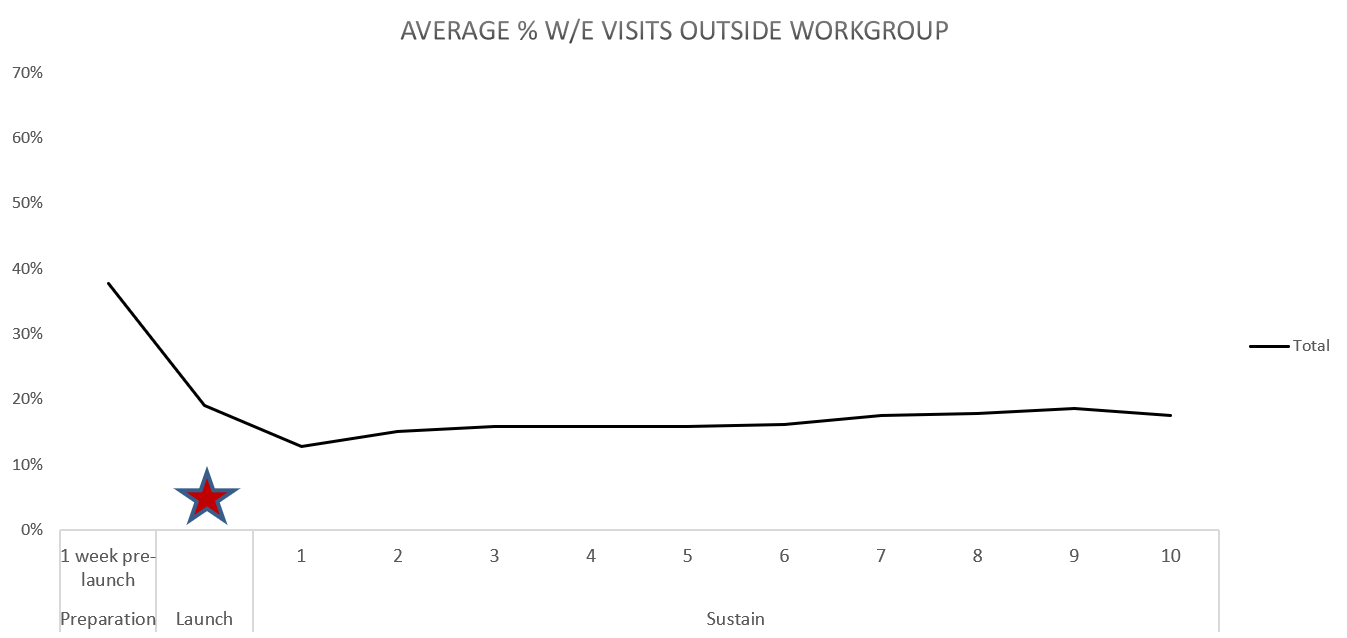Essential Care on Weekends for Personal Support – An Innovative Approach to Building Capacity

The featured image above shows personal Support Worker coaches Cynthia Matundan (left) and Joie Francisco (right). Both are members of VHA Home HealthCare’s Essential Care on Weekends Steering Committee.
The shortage of health human resources is a significant challenge for many organizations across the health sector, and the pandemic has only made things worse. VHA Home HealthCare (VHA) has struggled to recruit enough PSWs to support our increasingly complex clients and especially those who need care on weekends. These capacity issues have limited the ability to accept new clients at times, especially those who require weekend care. Recognizing the tremendous strain the system is under, VHA sought creative solutions to enable care for all who need it most.

Mockup of the ECOW letter to clients on kitchen table
Finding Capacity – Essential Care on Weekends Pilot Project
In spring 2021, VHA implemented a pilot in the personal support program called ‘Essential Care on Weekends’ in one of our regions. Launched with the support of the local Home & Community Care Support Services, this initiative involves weekend personal support service focusing only on ‘essential care’ and adjusting schedules so that ‘care + travel’ can be completed within one hour during peak times. Once essential care is provided, the PSW leaves for the next client. ‘Essential care’ focuses only on what is needed for safety for each client. To allow for ‘care + travel’ to be completed within one hour, PSWs are assigned in smaller geographical teams where travel time between clients is minimized, to 15 minutes or less.
Before launching Essential Care on Weekends (ECoWs), VHA worked closely with the local Home & Community Care Support Services managers and care coordinators and implemented an extensive communications strategy to ensure all clients, PSWs and scheduling Coordinators were aware of and understood the changes in advance. Care plans were reviewed so individual risks and concerns could be discussed and to make sure clients and families were prepared to expect flexible scheduling. And communications reinforced the safety of all clients as the priority.
The project team also outlined a logic model and evaluation plan to understand and measure the impact of the initiative including detailed monitoring of client visit scheduling.
Initial Findings
“It is clear from the feedback and the data we’ve reviewed that the ECoWs initiative has had a tremendously positive impact on scheduling, especially as it affects the experience of our PSWs,” shared Sandra McKay, VP, Research & Innovation at VHA and a member of the ECoWs steering committee and project team. PSWs have appreciated the reduced travel times and the ability to see more clients during their work time. One Coordinator shared that PSWs on her team “love the fact that they are in the same area. They aren’t traveling from postal code to postal code.” Coordinators have indicated that ECoWs has helped them do their job more effectively and they have been able to sustain the adjusted weekend scheduling over several weeks since the launch of the pilot.
“I’m glad to have the assurance that my high-risk clients will receive the care they need” says a VHA Personal Support Worker.
On the client experience side, some challenges were expected around managing the changes associated with ECoWs, particularly in situations where new PSWs needed to be assigned based on geography. Strategies were undertaken to mitigate these impacts. But encouragingly, a comparison of client complaints data before and after implementation show no measurable difference.
“We had also hoped to see improvements in key performance metrics such as reduced missed care and/or increased referral acceptance,” said Margery Konan, Senior Project Manager with VHA who co-chaired the ECoWs steering committee and project team. “Our initial review of the data indicates that these metrics have remained stable throughout the pilot period. The implementation coincided with Wave 3 of the COVID-19 pandemic, and we acknowledge that pandemic-related factors also contributed to these metrics.”

This chart demonstrates the reduction in Personal Support Worker visits booked outside their workgroup, which meant reduced travel time between visits for team members.
Key Learnings
The proactive communication approach with PSWs, Coordinators, clients and families proved to be very helpful in supporting everyone through this change. As one PSW shared, “the transition has been very smooth for my clients. They know what to expect during their weekend visits.” Ongoing research at VHA has shown that schedules and scheduling efficiency are powerful considerations for PSW work experience. Flexible arrival and departure times translate to reduced stress for personal support workers who otherwise would be constantly rushing to arrive “on time.” The commitment to scheduling practices that minimize travel time, particularly during the pandemic when many are conscious of limiting time on public transit, has been a meaningful improvement making team members feel respected and appreciated.
“We’ve learned a lot about supporting organizational change and effectively sustaining it over time. A strong commitment was needed from everyone – frontline staff, coordinators, supervisors, our data & analytics team and senior leadership as well as the ECoWs steering committee and project team,” added Margery.
Going forward, VHA is looking to expand the ECoWs approach to personal support to other regions. This program is most effective in situations where weekend PS capacity is limited, relative to weekday PS capacity. This will be an important consideration for expansion to ensure that adjustments do not simply shift pressure to different days without resulting in the desired improvements. There also may be opportunities to apply elements of this approach 7 days a week.
“We knew we needed to try something different to address the significant health human resource concerns. The idea for this pilot was generated through a ‘design sprint’ session where team members came up with bold, creative ideas that we then distilled into a program we could implement,” said Sandra. “This is a great example of the benefit of applying an innovation approach to address a major issue for our organization and we are very encouraged by the results of this pilot.”
